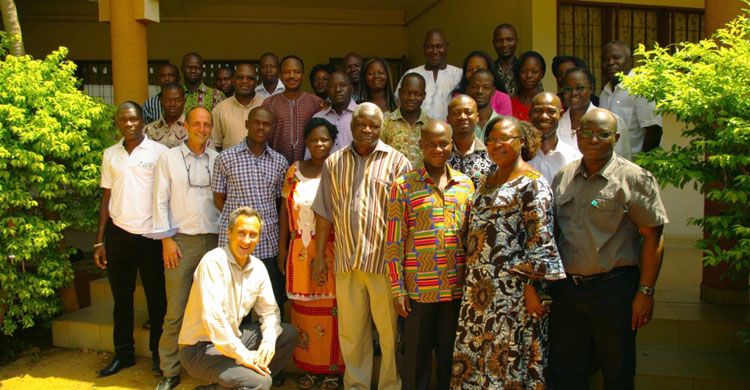New Training Programme to Help Boost Local Management of Wetlands in Africa

Participants attending the new certificate programme on local governance of African wetlands © TSU
Ouagadougou, Burkina Faso, June 2014 - The Technical Support Unit (TSU) of the AEWA African Initiative is involved in a new certificate programme on local governance of African wetlands. The involvement of the TSU will help integrate the use of AEWA tools into the training of wetland managers in Africa.
The new course was launched in June 2013 by the University of Ouagadougou (Burkina Faso) in cooperation with the University Leopold Senghor in Alexandria (Egypt) and the Ramsar Convention. It aims to train students and senior development officers, as well as wetland managers and planning professionals, particularly of Ramsar Sites, in order to give new momentum to the sound management of species and wetland ecosystems.
The training programme includes ten modules as well as thematic lectures and field trips, worth a maximum of 30 credits and equaling a total of 295 learning hours. Participants are required to write a synthesis paper in order to complete the course.
In the framework of the new training programme, Pierre Defos du Rau and Jean-Yves Mondain-Monval of the TSU taught a one-week module on monitoring of migratory waterbirds and its importance for the conservation of wetlands. This module was developed using, among others, parts of both the Flyway Training Kit (FTK), developed under the UNEP GEF Wings over Wetlands (WOW) African-Eurasian Flyways project, and the training module on waterbird monitoring provided by the French National Hunting and Wildlife Agency (ONCFS) and its partners.
The integration of such tools into the curricula of wildlife and wetland training institutions in Africa is one of the priorities of the AEWA Plan of Action for Africa, which was adopted at the 5th Meeting of the Parties to AEWA (MOP5) in 2012.
In her capacity as the AEWA Sub-regional Focal Point Coordinator for Western Africa, Ms Germaine Ouedraogo participated in this training scheme. Among other activities, a field-based training session enabled useful exchanges on the link between waterbird monitoring and wetland management. Some twenty Burkinabé participants, most of them managers of Ramsar Sites, are currently enrolled in the new training course. In future, it is intended to open the programme to international participation from wetland managers and development professionals from other countries.
Background information
The Technical Support Unit is a team of experts supporting the implementation of the AEWA Plan of Action on the ground, at the sub-regional level. This support mechanism, offered by the Government of France, was confirmed by AEWA Resolution 5.9 on the Implementation of the African Initiative for the Conservation of Migratory Waterbirds and their Habitats in Africa. It is composed of representatives from two countries (Senegal and France) and four technical Partners (the Direction of National Parks (DPN), Senegal; the Direction of Water and Biodiversity (DEB), France; the Tour du Valat Research Centre, France; and the French hunting and wildlife agency (ONCFS).
The Flyway Training Kit (FTK) is a unique training resource on the flyway approach to the conservation and wise use of waterbirds and wetlands. It was developed under the the UNEP GEF Wings over Wetlands (WOW) African-Eurasian Flyways project following an in-depth analysis of the knowledge gaps and training needs for waterbird and wetlands conservation in the AEWA region. The training kit consists of three modules aimed at improving the implementation of AEWA and the Ramsar Convention by different target groups in different aspects at the national level, while focusing on the flyway approach. In addition to serving as a pedagogic tool, the FTK is intended principally for conducting Training of Trainer courses (ToTs), which aim to equip trained persons with the necessary skills for conducting similar training courses at the national and regional levels.
The ONCFS Training Module on Waterbird identification and surveying in Africa is a toolkit which serves as an educational resource as well as a tool for conducting training on the delivery of training courses for waterbird identification and waterbirds counting in Africa. It is currently available in Arabic, English and French, while a Portuguese version is currently under development. The tool kit is also available in two versions – one specific to Northern African and the second for Sub-Saharan Africa. The AEWA Plan of Action for Africa promotes the use of this tool for improving the capacity for waterbird survey and monitoring in the African region.
The AEWA Plan of Action for Africa (PoAA) 2012-2017 is the operational guideline for the implementation of the AEWA African Initiative, over the same period. The PoAA, which was adopted at the 5th Session of the Meeting of the Parties to AEWA in 2012, identifies a variety of concrete actions in order to help translate the objectives of the AEWA Strategic Plan 2009-2017 into tangible results on the ground.
The UNEP/AEWA Secretariat plays a central role in guiding the implementation of the African Initiative, including the Plan of Action for Africa. At the sub-regional level, guidance is provided by Sub-regional Focal Point Coordinators, nominated from among the AEWA National Focal Points in each of the five sub-regions of Africa. Valuable technical support for the implementation of the African Initiative, including the Plan of Action for Africa, comes from the TSU.
Further information on the AEWA Plan of Action for Africa is available on the AEWA website.
Last updated on 25 August 2014


